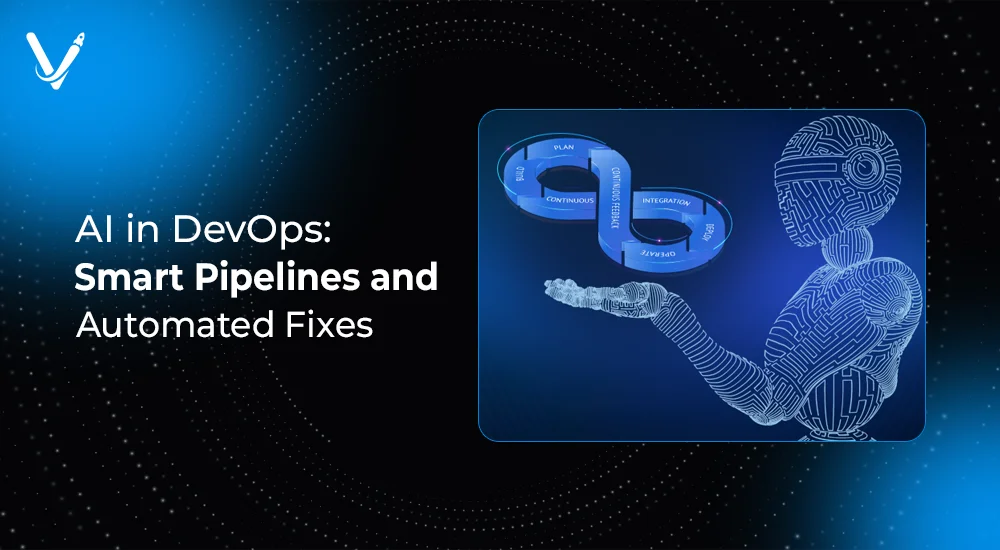AI in DevOps: Smart Pipelines and Automated Fixes


- Jun 26, 2025



In a landscape where software delivery speed defines competitive edge, DevOps has emerged as the essential methodology bridging development and operations. But as systems grow more complex and user expectations skyrocket, even DevOps needs a boost. This is where Artificial Intelligence in DevOps steps in — not just as a trend but as a transformative force enabling smart pipelines, self-healing infrastructure, and automated problem resolution.
This article dives deep into how AI is reshaping the DevOps lifecycle — from intelligent CI/CD pipelines and predictive analytics to automated anomaly detection and real-time incident management. Whether you're optimizing for speed, stability, or security, integrating AI into your DevOps processes isn’t optional anymore — it’s critical.
Let’s explore the real impact of AI on modern DevOps.
DevOps aims to improve collaboration, speed, and agility. However, traditional DevOps practices often struggle with:
With thousands of logs, metrics, and alerts flooding in daily, manual monitoring becomes infeasible. That’s where AI-powered DevOps (AIOps) brings value — automating repetitive tasks and surfacing intelligent insights for proactive action.
AIOps stands for Artificial Intelligence for IT Operations. It uses machine learning (ML), big data, and automation to analyze large volumes of data from different DevOps tools and environments.
Core functions of AIOps include:
Continuous Integration and Continuous Deployment (CI/CD) pipelines form the backbone of DevOps. AI can supercharge these pipelines in several impactful ways.
AI tools like DeepCode, Codacy, and Amazon CodeGuru can automatically scan codebases and flag potential bugs, security flaws, or coding standard violations before merge. These tools:
Real-world example: Facebook uses its AI tool, Sapienz, for intelligent test case generation and bug detection across code branches before production deployment.
AI models can predict system load and automatically scale CI/CD runners or compute instances to optimize build time. Tools like Google’s Kubernetes AutoScaler and Harness.io integrate AI to ensure minimal infrastructure costs while maintaining high availability.
Rather than running entire test suites, AI-powered CI tools can analyze recent code changes and run only relevant tests. This reduces pipeline runtime while maintaining test coverage.
Benefits:
AI’s ability to predict system behavior based on historical data is a game-changer for DevOps.
Using time series data and ML models, AIOps platforms can anticipate:
Case Study: PayPal adopted an AI-based forecasting system to anticipate transaction delays and reroute traffic, reducing downtime by 26%.
AI models analyze past release patterns to estimate the potential risk of a new deployment. These insights help teams make data-driven decisions about go/no-go scenarios.
Tools that support this:
AI can analyze user interactions to predict peak usage times or feature adoption. This helps DevOps teams pre-scale infrastructure or optimize deployments accordingly.
Traditional monitoring tools generate floods of alerts — many of them false positives. AI filters noise and brings clarity.
Instead of relying on predefined thresholds, AI tools learn the normal behavior of your system and flag any anomalies.
Popular tools:
AI systems can automatically analyze logs, traces, and metrics across distributed systems to pinpoint the root cause of incidents — something that could take human engineers hours or days.
Example: Netflix uses its own AI-driven telemetry system to conduct RCA within seconds for complex microservice outages.
Instead of bombarding teams with hundreds of unrelated alerts, AI clusters similar events and alerts relevant stakeholders with context and remediation steps.
Perhaps the most revolutionary aspect of AI in DevOps is automated remediation — where the system fixes itself.
AI can monitor post-deployment KPIs like error rates and user activity. If anomalies are detected, it can:
AI-powered systems can:
Example: Spotify’s internal platform uses reinforcement learning to dynamically tune Kubernetes pods based on application demand and latency SLAs.
AI bots like GitHub Copilot Chat, Slack bots, or Microsoft’s Azure DevOps Bot can interact with teams, suggest fixes, and even execute automated scripts upon approval.
Incorporating AI into DevOps offers significant advantages:
Despite the benefits, AI in DevOps is not without hurdles.
AI models need large, clean datasets. Inconsistent or sparse data can lead to false positives or irrelevant insights.
AI systems must seamlessly integrate across diverse DevOps tools (Jenkins, Docker, Git, Kubernetes). This requires well-defined APIs and connectors.
Teams may be reluctant to adopt AI decisions without understanding the “why” behind them. Explainable AI (XAI) models are critical for adoption.
AI infrastructure and personnel training come with upfront costs. However, the long-term ROI often justifies the investment.
Begin with Observability Tools
Start by integrating AI-powered observability tools like Datadog, Dynatrace, or New Relic.
Build an AIOps Roadmap
Identify your top DevOps pain points — build/test latency, false alerts, slow RCA — and focus AI on these first.
Use Pretrained Models and APIs
Don’t reinvent the wheel. Use pretrained AI models (AWS DevOps Guru, Azure ML for DevOps) to avoid cold starts.
Foster a Data-First Culture
Standardize logging, metrics, and tracing across the stack. AI thrives on structured, consistent data.
Upskill Your Team
Train your developers and SREs on using AI tools — not necessarily on building models, but on interpreting and acting on AI recommendations.
As AI models become more accurate and lightweight, we’ll see a rise in:
The end goal? A truly cognitive DevOps ecosystem where intelligent agents orchestrate the entire lifecycle — from commit to deployment to rollback — with minimal manual intervention.
AI is not just adding efficiency to DevOps — it’s redefining it. By introducing intelligent automation, predictive insights, and self-healing systems, DevOps teams can scale faster, fail less, and recover instantly.
Whether you're a startup seeking faster deployments or an enterprise managing millions of users, integrating AI into your DevOps strategy is the future-proof move your team needs today.
Vasundhara Infotech specializes in crafting intelligent, scalable solutions using AI, DevOps, and modern cloud-native technologies. Ready to bring smart automation into your DevOps lifecycle? Let’s build your intelligent delivery pipeline today.
Copyright © 2026 Vasundhara Infotech. All Rights Reserved.